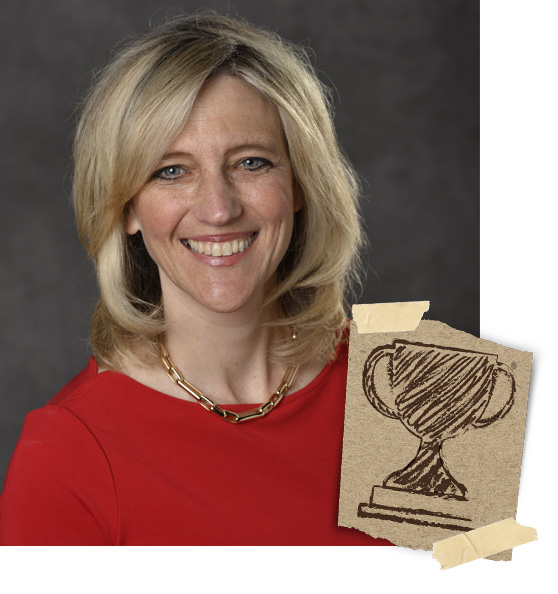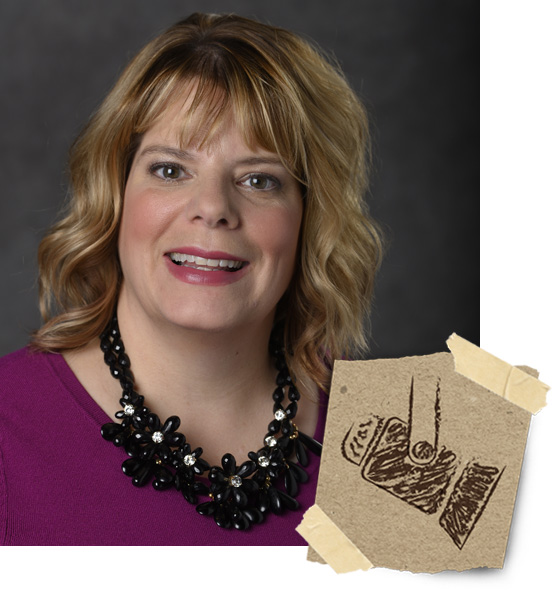Diversity Champion: Dr. Amy Bonomi
March 16, 2021 - Liz Schondelmayer
 As a founding member and former director of the Women's Leadership Institute, empowerment and advocacy have always been central to Dr. Amy Bonomi's work as an academic and an activist. This Women's History Month, Dr. Bonomi shares more about her impactful research, as well as the importance of empowerment and intersectionality in women-focused spaces.
As a founding member and former director of the Women's Leadership Institute, empowerment and advocacy have always been central to Dr. Amy Bonomi's work as an academic and an activist. This Women's History Month, Dr. Bonomi shares more about her impactful research, as well as the importance of empowerment and intersectionality in women-focused spaces.
The Women's Leadership Institute was launched within the College of Social Science in 2013, and since become a campus-wide success, providing networking and learning opportunities for Spartan students, alumni, faculty and staff.
The inspiration for the WLI came from equity-minded MSU alumni who are committed to achieving equity for women worldwide by igniting women leaders. In this spirit, these MSU alumni created annual leadership training and networking opportunities for women students (and their allies) at the intersection of race, ethnicity, LGBTQIA and other minoritized identities—to improve confidence, build skills, navigate bias, and help support and advance students in the direction of their dreams.
These training and networking opportunities have changed the life course and enhanced leadership opportunities for participants—especially during these stressful times of COVID-19 and the recent racial atrocities at the national level that have caused strain, especially for individuals with minoritized identities.
Outside of her work with the Women's Leadership Institute, Dr. Bonomi is a nationally-renowned researcher and teacher. Her research often tackles social inequities, such as racism and sexism, as well as domestic violence prevention.
Much of the focus of the Women’s Leadership Institute programming examines the ways in which bias has historically disadvantaged and worked against women leaders at the intersection of race, ethnicity, LGBTQ+ and other minoritized identities.
This very same bias is at play in the violent relationships that I study, whereby domestic abusers use an interlocking pattern of power and control dynamics—including sexist practices—against female victims. Research shows that men who perpetrate domestic abuse use sexism as one of many tactics to exploit their victims. For example, domestic abusers often act like the “master of the castle,” expecting their female victim to be subservient and abide by an impossible set of rules. This includes controlling what the victim can/can’t eat, calling the victim derogatory sex-based names, degrading her physical appearance, and controlling her finances.
Intersectionality is a critical lens that informs my work in violence prevention, including my expert testimony work at the federal and state levels. For example, educating juries requires a focus on the reality that 1 in 3 women (34.5%) in the United States will be physically abused in their lifetime by an intimate partner (National Institute of Justice, 2016). Women with minoritized racial and ethnic identities suffer even higher violence rates; as an example, 1 in 2 Native women (55.5%) will suffer physical abuse by an intimate partner in their lifetime (National Institute of Justice, 2016).
Intersectionality is central to Dr. Bonomi's feminist work, and she emphasizes the importance of using our various points of privilege to advocate for and support women who have experienced fewer historical privileges in society.
Equity recognizes that advantages and barriers exist across social identity points (e.g., gender, race, social class), and as result, we all don’t start from the same place. To be truly intersectional in a feminist space requires our intent focus and commitment in three areas:
1) Treat equity and inclusion as an ongoing re-socialization practice, where we commit to ongoing training (at the individual and organizational levels) to deconstruct bias at intersectional identities, commit to mindfulness, and learn the skills of interrupting microaggressions, problematic practices, and biased policies. A one-time equity and inclusion training isn’t enough. At the individual level, for example, we must constantly seek training to help us explore our own intersectional identities, probe our biases, build intersectional networks, and identify partners to regularly practice and converse with.
2) Be willing to dismantle systems that have historically advantaged white heterosexual cisgender individuals. This means moving from performative allyship (where we profess support for individuals with minoritized identities without following through with actions) to active allyship (where we use our power and privilege to leverage power for those with less power). Active allyship looks like this: regularly supporting Black-owned businesses, ensuring that our policies engender the equitable promotion of Black, Indigenous and Persons of Color to senior leadership positions within the organization, and regularly surveying how well we are doing as an organization to welcome diverse social identities, ideas and perspectives.
3) Become lifetime-committed equity consumers and practitioners. In the practice of re-socializing yourself, reorient yourself to reading books and viewing films that spotlight intersectional experiences of sexism, racism, homophobia, ableism; practice identifying how and when these are being played out. Write a personal vision statement with monthly/quarterly goals. No matter where you sit within your organization, encourage that staff, student and leadership meetings regularly include a focus on equity and inclusion.
Read more:

Diversity Spotlight
Alumni
Christine Mason Soneral
Christine Mason Soneral, an MSU Political Science Alumna, is Senior Vice President and General Counsel for ITC Holdings Corp. She is also Co-Founder and Executive Board Member of the MSU Women’s Leadership Institute.
Diversity Torch
Student
Danielle McClain
Danielle McClain is a third-year MSU College of Social Science student majoring in Political Science and Pre-Law. She has interned both for the City of Detroit and Michigan House of Representatives.

Diversity Matters
We strive to cultivate an inclusive and welcoming college environment that celebrates a diversity of people, ideas, and perspectives.

